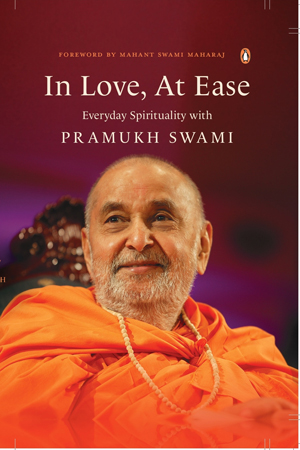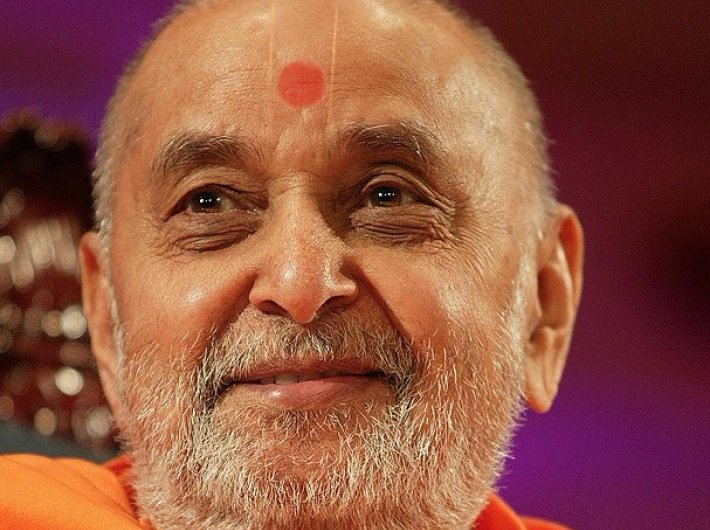Narsinh Mehta’s Bhakti Song in a Syrian Refugee Camp: An excerpt from 'In Love, At Ease: Everyday Spirituality with Pramukh Swami'
In Love, At Ease: Everyday Spirituality with Pramukh Swami
By Yogi Trivedi
Penguin Random House, 360 pages, Rs 499
 Spirituality often seems unattainable and otherworldly. Spiritual masters who connect with the real world ground this spirituality in everyday life. They take spirituality beyond any race, religion, caste, creed, color, and gender. They make spirituality everyday and universal. His Holiness Pramukh Swami Maharaj was one such universal spiritual master who transcended his own identity as a saffron-clad, Gujarati, Swaminarayan Hindu monk and guru. His ability to connect with people, living beings, and the world he lived in with a sense of selfless service and devotion and with a sense of humility and inclusivity made him one of the more prominent spiritual masters of his time.
Spirituality often seems unattainable and otherworldly. Spiritual masters who connect with the real world ground this spirituality in everyday life. They take spirituality beyond any race, religion, caste, creed, color, and gender. They make spirituality everyday and universal. His Holiness Pramukh Swami Maharaj was one such universal spiritual master who transcended his own identity as a saffron-clad, Gujarati, Swaminarayan Hindu monk and guru. His ability to connect with people, living beings, and the world he lived in with a sense of selfless service and devotion and with a sense of humility and inclusivity made him one of the more prominent spiritual masters of his time.
He was ‘In Love, At Ease’ with himself and those around him, and it was this natural organic version of himself that made him accessible. This book looks at everyday lessons of spirituality from his life that help the reader think about being a better father, mother, wife, husband, son, coworker, and employer—a better human being. It is a personal heartfelt collection by the author that will take the reader for a journey from the foothills of the Himalayas to Syrian Refugee camps with anecdotes, history lessons, and verses of bhakti love poetry that are relatable to teens and youth looking for answers on human interaction, spiritual progress, and overall development. The Foreword by Pramukh Swami’s spiritual and administrative successor, Mahant Swami Maharaj, carries the weight of spiritual authority from within the community, and the global anecdotes and register by the author carry the accessibility necessary to speak to people outside of the community.
Yogi Trivedi, a scholar of media and religion at Columbia University and a Fulbright Scholar, took his first steps and his first fall in Pramukh Swami’s presence. He travelled intermittently with the guru for almost three decades after that and eventually even served in his personal waiting staff. The moments he witnessed in the guru’s presence created a lens for him to see the world with an open mind and heart. These spectacles became the means for him to engage with journalists, heads of state, and even notorious terrorists in the coming years as a broadcast journalist, professor of journalism at Columbia University in New York, scholar, and mediator and political consultant. This book weaves in stories from his interactions with these people in over 70+ countries along with the frame for spirituality and personal growth set forth by his own guru. His experience as a performer and commentator of bhakti poetry and music adds to the flavor of this poetic and musical personal heartfelt recollection.
EXCERPT
(In this excerpt, the author is describing his visit to a Syrian refugee camp, where he meets an Imam and his family. The conversation soon turns to Indian spirituality. The Imam kept insisting that he finish the last of the dates and the biscuits, whereas the author wanted to leave them for the Imam’s children, who were eyeing them. The Imam then said he wanted to feed the Divine within him by offering the food to the author. Now you can pick up the thread below:)
He must have gauged the concerns of my mind. ‘Professor, you are probably thinking, ‘What kind of father puts a stranger before his own kids?’ I see my children in you; I see them within every child and young adult in this camp. Living in this camp has taught me to give and share everything we have with whoever walks through that door. Today, He comes through you. The greatest thing this camp has taught me is to look beyond—to see you for more than the Hindu, American, Indian, professor and journalist from New York that you are, and to look within you. To see you as His child. To experience myself as more than a Syrian refugee, Muslim, Imam and father. Yes, we are different, but urging myself to look beyond what I see on the surface allows me to appreciate the similarities between us. It helps me live and love with a heart and mind without corners. Nothing to hide or hoard, no one to protect or fear. I try to experience the world with an eye of oneness.’
It all sounded so familiar to me: lessons from the bhakti poetry I sang and the Hindu scriptures I read, as exemplified by and through Pramukh Swami Maharaj’s life and his lessons. I sat with the Imam’s family in silence trying to reflect beyond the preconceived notions with which I had entered the camp. I asked him if I could sing a bhakti pad (devotional song). He smiled and said, ‘No corners, remember?’ I channelled two verses from the bhakti song of the fifteenth-century Gujarati poet, Narsinh Mehta, to capture the sentiment of the moment:
akhil brahmaandma, ek tu Shri Hari
jhujhave rupe, anant bhaase;
deha ma deva tu, tej ma tattva tu,
shunya ma shabda, tu veda vaase . . .
vruksha ma bij tu, bij ma vruksha tu,
juo patantaro, e ja paase;
bhane Narasaiyo, e man tani shodhanaa,
prit karu premathi, pragat thaashe . . .
In the entire universe, You are One—oh Shri Hari [God]
manifest in different forms, appearing infinite [in all places];
You are the Divine within the mortal body, You are the essence
of the Light,
In the ethereal silence [void], You are the words of the Vedas . . .
You are the seed within the tree, and the tree within the seed,
One looking for separation, will only experience division;
Narsinh sings, futile is an intellectual search,
Love Him, and He will lovingly manifest [in one of many
forms] . . .
This prabhati (early morning bhakti song) is a favourite in rural villages and cities across western India. The poet speaks of the Divine which pervades all of creation and, hence, is the universal common denominator. The poet urges the spiritual aspirant to search for and experience the Divine through this oneness—an equality that unites. Through love, this oneness, which dissolves differences and breaks down borders, will become apparent. The Divine unites us all. This was the quest of the Imam, and it was this quest that reminded me of the message of my guru Pramukh Swami Maharaj.
If the first two chapters [of this book] describe Swamishri’s way of being—in love and I-less—this chapter exemplifies how bhakti and ahamshunyata translated into everyday spirituality in his life. When one is ‘in love’ and ‘I-less’, one can embrace all, uniformly and impartially. To ‘embrace all’, one has to experience and love the Divine within, while casting aside one’s ego and self. To ‘embrace all’, one has to be free from prejudice, bias, judgment and partiality. To ‘embrace all’, one has to accept with an open mind and forgive with an open heart. The lessons of the previous chapter work here as prerequisites.
Equality, equilibrium and equanimity have a principal place in Hindu spirituality. Despite the common misconception that premodern social structures are built around systems of hierarchy for oppression and marginalization in Hindu society, respect and acceptance were a big part of the Hindu way of life. Hierarchy was an important part of early Indic life, but great spiritual leaders have shown through their words and actions that there is a great sense of value for human life and dignity. In the Shrimad Bhagavad Gita, Shri Krishna Bhagwan says that an enlightened soul is able to love every being equally and even-mindedly. He sees God in all of creation.* In the Vachanamrut, Bhagwan Swaminarayan states, ‘I look upon all devotees of God as being equal, i.e. I do not differentiate one as being superior and another as being inferior.’ Pramukh Swami Maharaj lived these lessons of equality and fairness revealed in the Shrimad Bhagavad Gita and Bhagwan Swaminarayan’s sermons. They were the basis of his spirituality.
The sheer diversity and breadth of people with whom Swamishri interacted are testament to his ability to experience and embrace Narsinh Mehta’s ‘Shri Hari’ everywhere. Add to that Swamishri’s ability to do so without prejudice and judgment, and with respect and fairness, one can experience the essence of Swamishri’s equality. Swamishri embraced those who were invisible to and marginalized by others, different or holding contradictory worldviews, physically distanced because of his celibacy vows as a sadhu in the Swaminarayan tradition, and even those who acted against him and his community. This chapter does not provide a detailed description of the organization’s social development initiatives for the marginalized, but rather focuses on Swamishri’s ecumenical and egalitarian intent to embrace the world. For this was the seed from which sprang the organization’s diverse activities and their impact.
[Excerpt reproduce with the permission of the publishers.]
